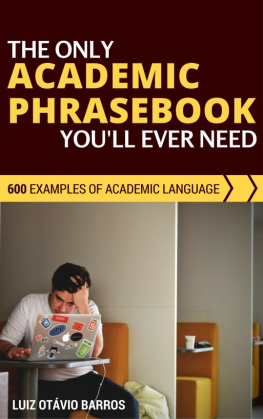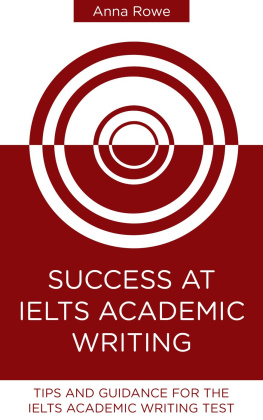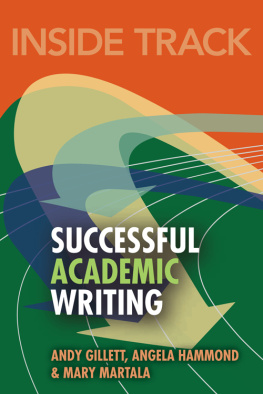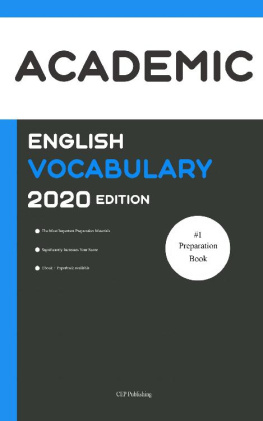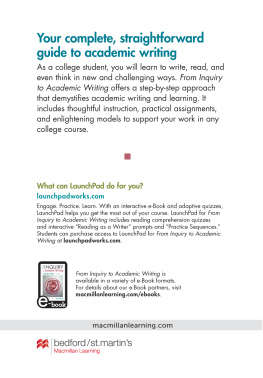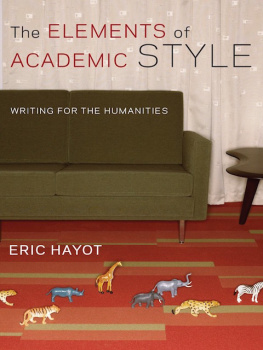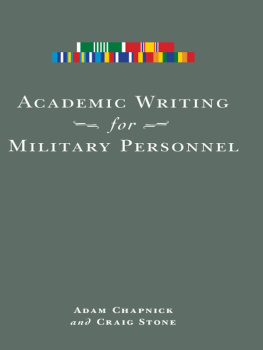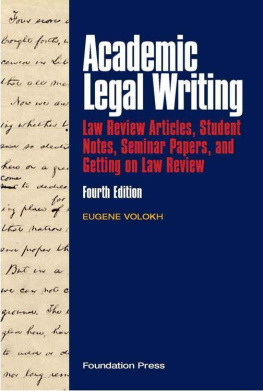THE ONLY ACADEMIC PHRASEBOOK YOU'LL EVER NEED
600 Examples of Academic Language
LUIZ OTVIO BARROS Copyright 2016 Luiz Otvio Barros All rights reserved. This e-book is licensed for your personal enjoymentonly. This e-book may not be re-sold or given away to other people.If you would like to share this e-book with another person, pleasepurchase an additional copy for each person you share it with. Ifyoure reading this book and did not purchase it, or it was notpurchased for your use only, then you should return toSmashwords.com and purchase your own copy. Thank you for respectingthe hard work of this author. CONTENTS
Heres a quick Q&A to help you decidewhether or not to download
The Only Academic Phrasebook YoullEver Need: Q:
I know what I want to say, but I cantfind the right words - or the right tone.
Will a phrasebook likethis be useful? A: Yes. It will enable you to expressyourself with more precision and clarity. For example, you willlearn how to write This study addresses the issue of rather thanThis study talks about. Or While there is wide agreement thatinstead of A lot of people agree that. Think of this book as apractical, no-nonsense databank of sentence frames to help youwrite essays, term papers, reports, dissertations and theses usingthe right words and the right style. Q: Great! I dont even know what anacademic paper looks like! A: So maybe you shouldnt download TheOnly Academic Phrasebook Youll Ever Need.
This book assumesthat you are also learning/have also learned the basics of academicwriting. It will NOT teach you how to write thesis statements,develop and refine your arguments or create coherent paragraphs,just to name a few key academic writing skills. The OnlyAcademic Phrasebook Youll Ever Need is, as the title suggests,essentially a phrasebook. It is NOT acomprehensive textbook or research guide . Q: English is not my first language. CanI use this book? A: It depends on your level of proficiency.Ideally, you should be at an upper-intermediate or advanced levelto make the most of it.
Q: Im a native speaker of English, but Ikeep getting things like there/their/theyre or affect vs.effect wrong. Will this book help me? A: Yes. As well as 600 sentence frames, youwill find 80 grammar, vocabulary and punctuation tips, written withboth native and non-native speakers in mind. I hope you enjoy using this book as much Ienjoyed writing it.
Special thanks to Dr. Patricia Friedrich, from Arizona StateUniversity, for her feedback on the final manuscript.
Establishing a research territory (Swalesand Feak, 2009) means setting a context for your research.
Thisusually includes a brief literature review as well as reference toother key developments in your research area. Your goal should beto establish yourself as a legitimate member of that particularresearch community. Sentences 1-50 will help you do that.
1. ____ has received a lot of research attention. 2. ____ has led to a renewed interest in____ 3.
In recent years, researchers have becomeincreasingly interested in ____ 4. The last few years have seen an increasedinterest in ____ 5. Numerous studies have investigated____ in recent years. 7. ____ has been extensively researched. ____ has been field-tested by ____ ____ On the use of active vs. passive voice: Sentences 1-6 are in the active voice (i.e., thesubject of the sentence performs the action of the sentence), whilesentences 7-9 are in the passive voice (i.e., the subject of thesentence receives the action). passive voice: Sentences 1-6 are in the active voice (i.e., thesubject of the sentence performs the action of the sentence), whilesentences 7-9 are in the passive voice (i.e., the subject of thesentence receives the action).
Some scholars frown upon the use of passive voice,especially when the agent (i.e.,the doer) of the action is notcompletely obvious. The decision of whether to use active (e.g.:We interviewed forty students.) or passive voice (e.g.: Fortystudents were interviewed.) has to be made in context, dependingon the research discipline. Be sure to follow the guidelines set byyour instructors. A number of recent studies have 10. examined ____ 11. focused on ____ 13. reported on ____ 14. reported that ____ 15. linked ____ to ____ 16. addressed the issue of ____ 17. shown that ____ 18. suggested that ____ 19. found concrete evidence that ____ 20. directly compared ____ and ____ 21. looked into the effects of ____ on____ Over the years, an enormous amount ofresearch has been 22. done on ____ 23. carried out in an attempt to ____ 24. conducted to determine ____ ____ Recent studies have explored the 26. use of ____ as ____ 27. impact of ____ on ____ 28. differences/similarities between ____and ____ The role of _____ has been 30. extensively studied in recent years. 31. grossly misunderstood. 32. largely overlooked. 33. overshadowed by ____ 34. viewed as ____ Considerable research attention hasbeen 35. paid to ____ 36. devoted to ____ 37. directed toward ____ now generally accepted that____ 39. ____ has generated a wealth of data on____ this area of investigation, anumber of studies ____ exists 41. regarding ____ 42. to support ____ 43. to prove (that) ____ 44. to suggest (that) ____ 45. to support the view that ____ 46. to support the hypothesis that ____ 47. to suggest a connection between ____ and____ 48. to suggest a connection between ____ and____ 48.
The study of ____ has become a keyaspect of ____ 49. ____ is an emerging research area in thefield of ____ 50. In 1799, Smith and Jones collaborated toinvestigate ____ Throughout this book: 1799 = Insert the year.
[N] = Insert a number.
Smith/Jones = Insert the scholars name. Reference: Feak, C. B.,& Swales, J. (2009). (2009).
Telling aresearch story: Writing a literature review. Ann Arbor, MI: University of MichiganPress.
GRAMMAR AND VOCABULARY TIPS 1
Tenseusage:
have/has + past participleHas emerged is an example of thepresent perfect tense. Use the present perfect rather than thesimple past (
emerged) with time expressions such as
recent, recently and
in the past / last [N]
years: WRONG: A number of studies were conductedin the past ten years. RIGHT:
A number of studies have beenconducted in the past ten years. Linkingideas:
due toDue to is a more formal way of saying
because of.
because it was discovered that/dueto the discovery that (NOT due to it was discovered that) b.
because there are a lot relevantstudies/due to the number of relevant studies. (NOT due tothere are a lot of) Trickyphrase:
devoted to If you use a verb after
devoted to,it must be in the
-ing form:
The first part of the questionnaire wasdevoted to investigating (NOT devoted toinvestigate)
the subjects exercise habits. The
-ing form must be used because
to in this case is a preposition (as in
get used toliving, look forward to hearing), not part of theinfinitive.
because there are a lot relevantstudies/due to the number of relevant studies. (NOT due tothere are a lot of) Trickyphrase:
devoted to If you use a verb after
devoted to,it must be in the
-ing form:
The first part of the questionnaire wasdevoted to investigating (NOT devoted toinvestigate)
the subjects exercise habits. The
-ing form must be used because
to in this case is a preposition (as in
get used toliving, look forward to hearing), not part of theinfinitive.
Trickypair: role in/role as Compare the use of in vs. asafter role:
This study examines a. The role of obesity as a riskfactor. b. The role of memory in languageacquisition. c. The role of meditation in treatingcancer.

